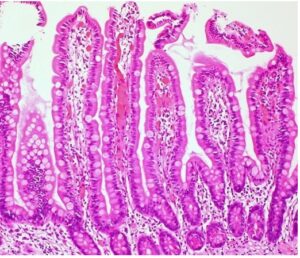
If you or someone you love has been recently diagnosed with coeliac disease, you could be eligible to receive gluten free foods on prescription. Simply select your country of residence, and, if you live in England, fill in your postcode to check if your area is prescribing.
Your country is prescribing gluten free foods*. Request your Glutafin Taster Box by clicking the button below to sign up.
* Please note: local policies are constantly updated, and issuing a prescription is at the discretion of your GP.

As you may have been told by your dietitian, coeliac disease is an autoimmune condition. Your immune system, which normally fights infections, mistakes gluten for a threat. This causes a reaction which damages the lining of the small intestine, as shown below. In the vast majority of cases, following a gluten free diet will resolve your symptoms and allow your gut to heal.
 Healthy intestinal surface |
 Intestinal surface damaged by coeliac disease |
The damaged lining is no longer able to absorb nutrients the way it should. This can cause some of the common symptoms associated with Coeliac disease, such as diarrhoea, constipation, wind and abdominal pain. The good news is that if gluten is removed, then the autoimmune reaction will stop, and the intestinal lining will be able to recover.
Many people will notice that some symptoms, such a diarrhoea and stomach pain, start to improve after just a few days. However, you do need to be patient, as it can take several weeks, or even months to feel completely better.
There is currently no cure for coeliac disease, so you will need to follow a gluten free diet for life. If you don’t then you will not only continue to experience the unpleasant symptoms, you also put yourself at risk of complications such as osteoporosis, anaemia and some rare forms of bowel cancer. Even a small amount of gluten can trigger your old symptoms, so it’s important to follow the diet carefully. Provided you follow a strict gluten free diet, you will be able to lead a healthy life with no greater risk of ill health than the general population.
After starting a gluten free diet, some people with coeliac disease notice that they gain a little weight. This is because the gut has been allowed to heal and has begun absorbing nutrients from food again. It’s important to maintain a healthy diet, with plenty of fruit and vegetables and sensible portion sizes. To ensure you are getting all of the right vitamins and minerals to keep your body healthy. If you are concerned about your weight, speak to your doctor or dietitian for more advice.
In the vast majority of cases, following a gluten free diet will resolve your symptoms and allow your gut to heal. If you continue to feel unwell, speak to your doctor or dietitian. The most common reason for ongoing symptoms is continued, accidental gluten exposure.
Making the adjustment to a gluten free diet can feel daunting initially, however, once you make the change, you can live a happy, healthy gluten free lifestyle. What’s more, if you are diagnosed with coeliac disease, depending on which area of the country you live, you may be entitled to receive some products on prescription. We know this can be an unsettling time, however, Glutafin is here to help you.
Image credits:
Normal Mucosa, Ed Uthman, CC BY 2.0
If you or someone you love has been recently diagnosed with coeliac disease, you could be eligible to receive gluten free foods on prescription. Simply select your country of residence, and, if you live in England, fill in your postcode to check if your area is prescribing.
Your country is prescribing gluten free foods*. Request your Glutafin Taster Box by clicking the button below to sign up.
* Please note: local policies are constantly updated, and issuing a prescription is at the discretion of your GP.
Share this now: